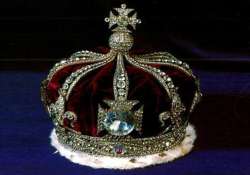Kohinoor India’s property, devising ways for its retrieval, govt tells SC
The government has told the Supreme Court that the 105-carat Kohinoor diamond was India’s property and that it wasn’t gifted to Queen Victoria.

The government has told the Supreme Court that the 105-carat Kohinoor diamond was India’s property and that it wasn’t gifted to Queen Victoria.
In an affidavit filed yesterday, the government, however, said that international conventions and laws restrain it from making a rightful claim for its return from Britain.
The affidavit added that the government was devising ways and means to negotiate with the British government to bring back the colourless diamond that was found near Guntur, possibly in the 13th century.
“The government was mindful of the Indian public sentiment attached with the gem,” the affidavit said, adding that “it will have to resort to diplomatic relations to seek its retrieval”.
The government’s reply came following a case filed by an organisation seeking directions to the British India High Commissioner for returning the diamond among other treasures like belonging of Tipu Sultan, Bahadur Shah Zafar and Rani of Jhansi.
The Kohinoor is one of the oldest and most famous diamonds in the world. The history of the Kohinoor goes back in history to more than 5000 years ago. The current name of the diamond, Koh-i-noor is in Persian and means ‘Mountain of Light’. It is believed that the diamond was first mentioned more than 5000 years ago in a Sanskrit script, where it was called the Syamantaka.
The Kohinoor issue snowballed into a major controversy after the government made a submission in the Supreme Court in April that it was neither ‘forcibly taken nor stolen’ by the British but given as a ‘gift’ to the East India Company by the rulers of Punjab, indicating it cannot be claimed by India now.
The gem is the subject of a historical ownership dispute and has been claimed by at least four countries, including Pakistan.